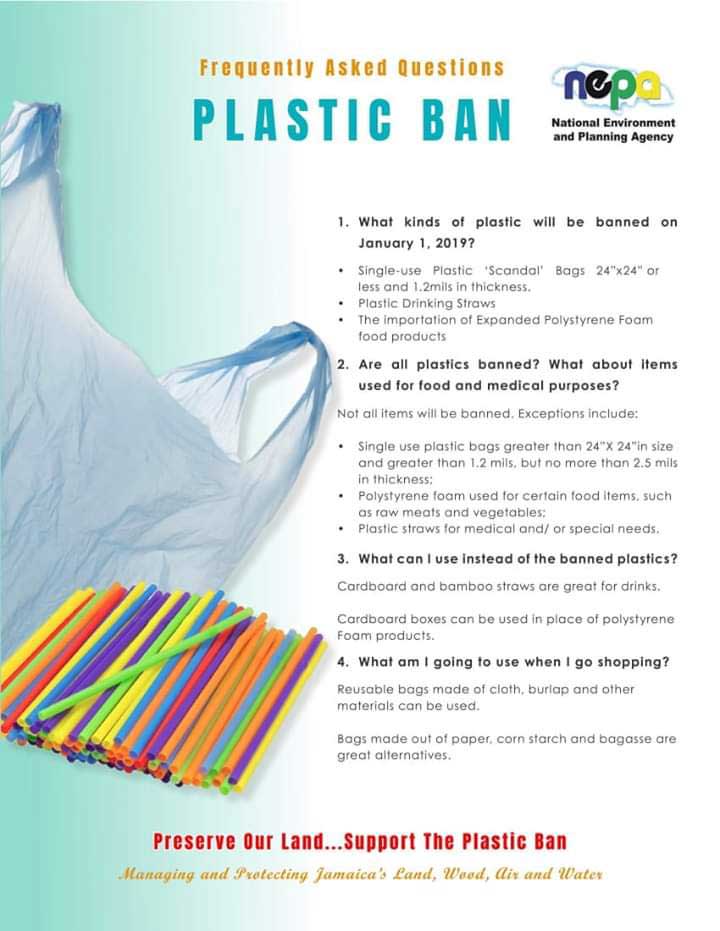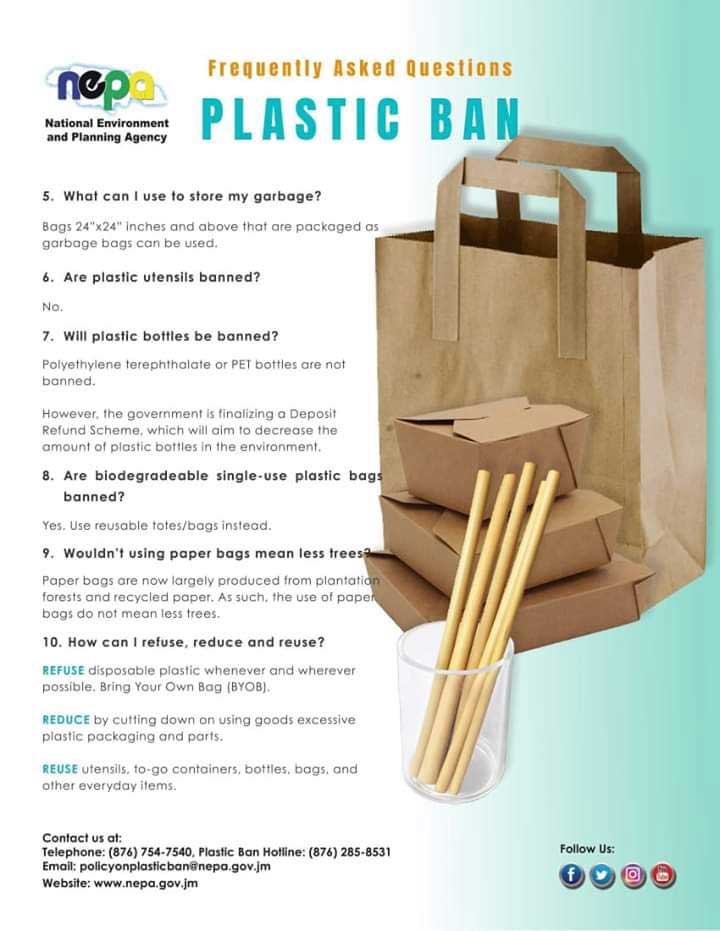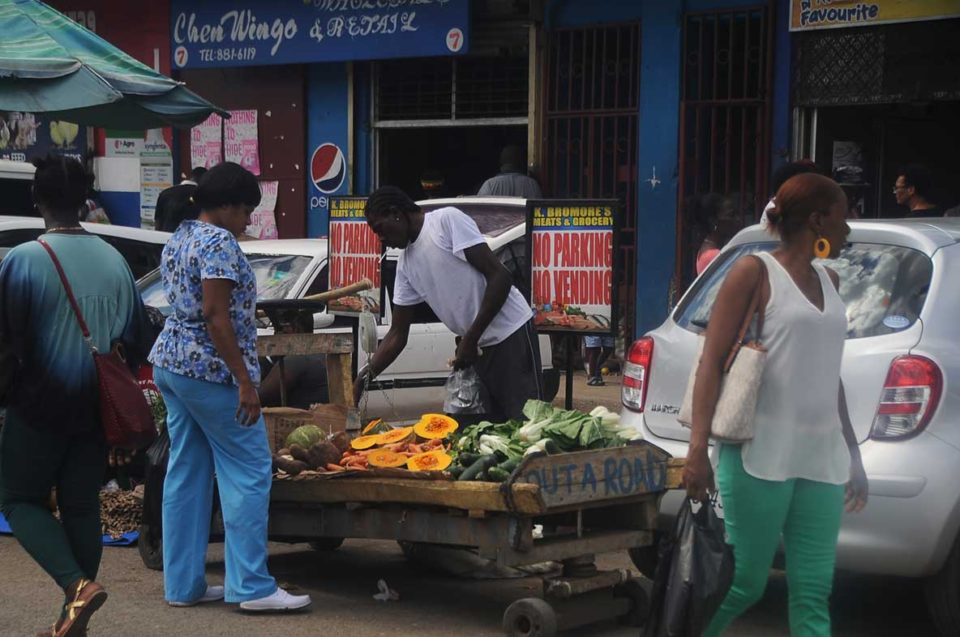Jamaicans are facing a new year full of challenges and adjustments. In addition to the perennial challenges of crime, underemployment, unemployment, a fluctuating dollar, and rising domestic violence that have become a familiar part of the fabric of daily existence, they are now faced with major lifestyle changes that are likely to test both their character and their resilience as a people.
No More ‘Scandal’ Bags, Plastic Straws and Styrofoam Containers
Foremost among these changes and the first to which they will have to make an immediate adjustment is the ban on single-use plastic bags, plastic straws and styrofoam. There was a time when paper bags and brown paper were the common methods used to wrap and carry goods but somewhere along the line, paper bags were quietly and unobtrusively replaced by the black ‘scandal’ bag which has become the choice method throughout the country used by the largest supermarkets down to the smallest hustler on the street corner. It is true to say that almost two generations of Jamaicans know no other wrapping, carrying or serving material than plastic and Styrofoam. The country has paid dearly for this change in the flows of litter clogging drains and gullies when it rains; the plastics that end up in the food chain; the general degradation of the environment; the endangerment of the health of the people and the scar on the general beauty of the country. Jamaicans all agree, plastic is bad for the nation.

The adjustment will not be easy and postponing the implementation of the ban as some have asked for is only postponing the inevitable and will not make the problem go away. Jamaicans will have to be coaxed and be force-fed if necessary, into accepting the change. Businesses and traders will flaunt the ban at their own peril because the fines will be heavy with a maximum of J$2 million under the Trade Act and J$50,000 under the National Resource Conservation Authority (NRCA) regulations and if that’s not deterrence enough both Orders carry terms of imprisonment of up to 2 years. The most encouraging aspect of the ban and its best chance of success is the overwhelming support of Jamaicans and the knowledge that by taking this action it puts their country at the forefront of those imposing plastic restrictions around the world.

New Traffic Regulations
Further down the road in another three to four months, the other major adjustment that will affect Jamaicans in 2019 will be implemented in the form of a new Road Traffic Act. On December 10, jamaicaglobalonline outlined for Jamaicans and visitors to the country, elements of the new Road Traffic Act that was finally enacted after four years in the making. During those four years while Jamaica lagged behind the world in legislating changes to the use of its roads, over 1,000 Jamaicans lost their lives in motor vehicle accidents, many of which could have been prevented. In that story, we highlighted the changes that drivers and the owners of motor vehicles will have to be aware of and made the point that most of these were not new, but their strict enforcement and very heavy fines would require Jamaican drivers to make fundamental adjustments to their driving habits and use of the roads. Read our story complete with a listing of the new fines by following this link:
NEW RULES FOR DRIVING IN JAMAICA IN 2019: What visitors and locals must know about using the roads
No Longer in the Shadows: Big Brother Knows Who You Are
If the government has its way, and if the National Identification Act (NIDS) passes muster before a constitutional court, ALL Jamaicans from birth to death will have to submit to a process of registering themselves before the end of 2019. This National Identification System is the third major adjustment that ALL Jamaicans will have to make during 2019. NIDS, which is the acronym for the new system will digitally register all Jamaicans, including children living in Jamaica and anyone resident in the country for more than 6 months. Enrolment will be a legal requirement and failure to register will make a Jamaican ineligible for access to any government service. For many Jamaicans, NIDS will be a good thing as it provides them with a single form of identification acceptable for carrying out all the functions of a citizen and provide adequate protection of their identity. However, some of the proposed requirements of the New Act are seen by human rights advocates and other concerned citizens as having the potential to intrude on individual privacy as citizens. Jamaicaglobalonline posted a full analysis of the NIDS Act in an upload on November 2, 2018 under the heading “What all Jamaicans Living Overseas, in Foreign and Abroad must know about NIDS”. You owe it to yourself, your family and friends to read and share this upload as widely as possible by following this link:
WHAT ALL JAMAICANS LIVING OVERSEAS, IN FOREIGN AND ABROAD MUST KNOW ABOUT NIDS
In 2019, Jamaicans are encouraged to follow jamaicaglobalonline to learn about important developments affecting them in their communities. Whether you live in Jamaica, abroad, overseas, or in foreign jamaicaglobalonline accepts you as Jamaicans and want fellow Jamaicans to know about your challenges and your achievements.


